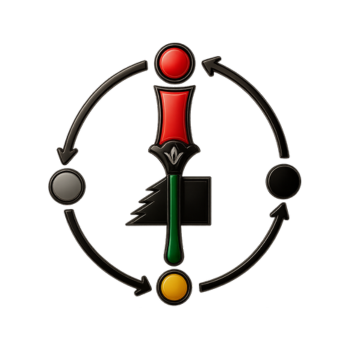-
 24,604
Abibisika (Black Gold) Points
24,604
Abibisika (Black Gold) Points
The fight against tyranny and haters of enlightening truth is eternal.
In what looks to be an intensifying quest to reshape American history and scholarship according to his own preferences, President Donald Trump this week targeted the Smithsonian Institution, the national repository of American history and memory. Trump seemed outraged, in particular, by the Smithsonian’s portrayal of the Black experience in America. He took to Truth Social to complain that the country’s museums “are, essentially, the last remaining segment of ‘WOKE.’ The Smithsonian,” he wrote, “is OUT OF CONTROL.” Then Trump wrote something astonishing, even for him. He asserted that the narrative presented by the Smithsonian is overly focused on “how horrible our Country is, how bad Slavery was, and how unaccomplished the downtrodden have been.
This article led me to seek a comparison between the African Atlantic slavery and the Jewish Holocaust:
My thoughts:
If Europeans can do this to their own kind; how much more can they do to other kinds?
The scale of devistation cannot be compared.
Europeans still refuse to confess their crimes against African people to this day.Compare the society impact of African Atlantic slavery and Jewish Holocaust
To compare the societal impacts of African Atlantic slavery and the Jewish Holocaust, it is crucial to recognize that both are horrific and uniquely devastating events, not a point of equivalence to weigh one’s suffering against the other. Rather, a comparison highlights the distinct ways these events reshaped societies, created long-term trauma, and left lasting legacies of inequality and memory.
Aspect Societal impact
Duration and scale
Lasting over 400 years, the slave trade forcibly displaced more than 12 million Africans. These massive population losses, particularly of young, productive adults, severely stunted Africa’s economic and political development.
Foundation of global economies
Enslaved labor, particularly on sugar and cotton plantations, generated immense wealth for European colonial powers and the United States, fueling the Industrial Revolution. This created an enduring global economic hierarchy that still affects the development of nations in Africa and the Americas.
Enduring racism and inequality
A system of racial hierarchy was created and justified to dehumanize Black people and legitimize their enslavement. This ideology persisted long after abolition, evolving into systemic racism, Jim Crow laws, segregation, and pervasive economic inequality that continues to haunt societies today.
Shattered social cohesion
In Africa, the trade destabilized societies by inciting wars between rival groups who traded captives for European goods, including guns. In the Americas, the enslavement system intentionally broke apart African families and destroyed social bonds to prevent rebellion, causing generations of cultural loss and trauma.
Memory and reparations
The legacy of slavery is an unresolved part of the national consciousness in many countries, particularly the United States. Unlike post-Holocaust Germany, the U.S. has generally resisted comprehensive federal reparations, in large part due to ongoing debates and racial divisions over acknowledging its past.
The Jewish Holocaust:
A targeted, state-sponsored extermination
Occurring over a much shorter but intensely brutal period (1941–1945), the Holocaust was the Nazis’ state-sponsored, systematic effort to annihilate the entire Jewish people.Aspect Societal impact
Duration and scale
The Final Solution was a program of total extermination, resulting in the murder of six million Jews. This represented about two-thirds of Europe’s Jewish population and approximately 40% of the world’s Jewish population at the time.
Irreparable cultural loss
The cultural heartlands of European Judaism, particularly in Eastern Europe, were almost completely destroyed. The Holocaust decimated the Yiddish language and centuries of intellectual and cultural tradition, from which the global Jewish community is still recovering.
Creation of modern human rights In direct response to the Holocaust’s horrors, the international community developed new concepts and laws to prevent such atrocities in the future. The 1948 UN Convention on the Prevention and Punishment of the Crime of Genocide was a direct outcome, as were the Nuremberg Trials and the establishment of the International Criminal Court.
Post-war reckoning and displacement The Holocaust created a massive displacement crisis, as Jewish survivors often returned to find their homes and communities destroyed, and sometimes, faced hostility from neighbors. This trauma and displacement heavily contributed to the eventual creation of the State of Israel in 1948.
Generational trauma and remembrance Research has documented the profound epigenetic and psychological trauma passed down through generations of Holocaust survivors. A unified memory of the event across Europe has driven decades of reparations and restitution efforts by the German government to individuals and the Jewish people.
https://www.theatlantic.com/ideas/archive/2025/08/trump-attack-smithsonian-slavery/683969/
theatlantic.com
Actually, Slavery Was Very Bad
The president’s latest criticism of museums is a thinly veiled attempt to erase Black history.

 Dr. Obadele Kambon: Africanisms in Contemporary English
Dr. Obadele Kambon: Africanisms in Contemporary English 
